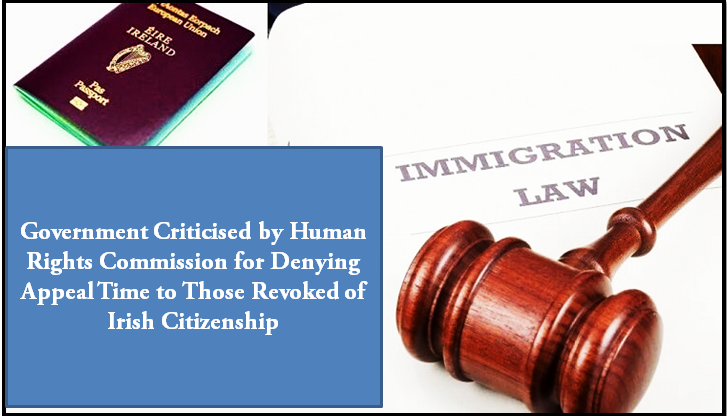Government Criticised by Human Rights Commission for Denying Appeal Time to Those Revoked of Irish Citizenship
Dublin: The Human Rights Commission has voiced strong opposition to the new stringent measures proposed in Ireland’s law concerning the revocation of citizenship. The new law stipulates that actions affecting national security or involving countermeasures will result in the revocation of citizenship. Additionally, involvement in unnecessary riots and acts of aggression may lead to deportation.
The Irish Human Rights and Equality Commission (IHREC) has warned that the Bill, titled the ‘Courts, Civil Law, Criminal Law, and Superannuation (Multiple Provisions) Bill 2024’, is set to be passed by the end of this week without significant debate or scrutiny. The IHREC has raised concerns that the government is moving too quickly to implement these new amendments, emphasising that implementing the law without thorough discussion would be dangerous.
One of the major concerns highlighted by the commission is that naturalised citizens would have limited time to file a complaint against an order of revocation of citizenship. The 1956 Amendments to the Citizenship Act already empower the Minister to initiate the process of revoking citizenship from naturalised citizens. The proposed changes would further restrict the number of days a citizen has to respond to the initial notice of revocation. Currently, there are no time limits for citizens to challenge revocation notices from the minister. The Minister must first inform them that their citizenship is subject to revocation and that a decision has been made through investigation.
However, under the proposed changes, a citizen would have only 28 days from the time they receive the minister’s initial notification to argue their case. Their arguments would be sent to an inquiry committee and the minister, where a preliminary decision would be made on whether or not to revoke the citizen’s status. If it is decided to revoke their status, the citizen would have an additional 14 days to challenge the decision, after which the case would be resolved promptly.
There have been very few revocation cases in the Irish court system so far in 2020. However, lawyers predict that as the number of people granted naturalised Irish citizenship increases in the coming years, there will also be an increase in revocation orders.
The IHREC has also expressed concern that the prescribed length of time for citizens to challenge a deportation decision—only 14 days—is unacceptable. The commission argues that the current bill does not provide the necessary procedural safeguards to meet the high standards of natural justice required for a person facing severe consequences.
Disputes have also arisen over the level of independence of the inquiry committee that reviews each revocation case. The minister has the sole power to appoint members to the committee, raising concerns about potential bias.
“This is incredibly worrying,” said Donegal TD Thomas Pringle. “One has to wonder why the government is so reluctant to allow proper scrutiny. If the government has faith in the law being introduced, allowing more time for scrutiny and engagement will not be a problem,” he added.
Irish Samachar English News
{OR} Kindly click to follow the Irish Samachar News channel on WhatsApp


Comments are closed.